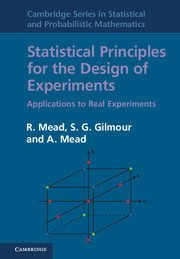Book contents
- Frontmatter
- Contents
- Preface
- Part I Overture
- Part II First subject
- Part III Second subject
- 12 Experimental objectives, treatments and treatment structures
- 13 Factorial structure and particular forms of effects
- 14 Fractional replication
- 15 Incomplete block size for factorial experiments
- 16 Quantitative factors and response functions
- 17 Multifactorial designs for quantitative factors
- 18 Split-unit designs
- Part IV Coda
- References
- Index
14 - Fractional replication
from Part III - Second subject
Published online by Cambridge University Press: 05 November 2012
- Frontmatter
- Contents
- Preface
- Part I Overture
- Part II First subject
- Part III Second subject
- 12 Experimental objectives, treatments and treatment structures
- 13 Factorial structure and particular forms of effects
- 14 Fractional replication
- 15 Incomplete block size for factorial experiments
- 16 Quantitative factors and response functions
- 17 Multifactorial designs for quantitative factors
- 18 Split-unit designs
- Part IV Coda
- References
- Index
Summary
Preliminary examples
(a) An industrial experiment is to be planned to investigate the effects of varying seven factors in a chemical process. It is decided to use two levels of each factor, and there is sufficient material and time to make observations on 64 treatment combinations. How should the 64 treatment combinations to be included in the experiment be chosen?
(b) An experiment on competition between grass and legume species is to be planned to investigate the effects and pairwise interactions of eight factors. The eight factors are:
(1) two different cutting regimes,
(2) two different grass species,
(3) two different legume species,
(4) two levels of phosphate,
(5) two levels of potassium,
(6) two levels of nitrogen,
(7) root competition between grass and legume allowed or restricted,
(8) shoot competition between grass and legume allowed or restricted.
The total number of experimental units that can be managed is 48. How should the 48 combinations be chosen?
(c) An experiment on making hot cross buns is to be planned to investigate the effects, both main effects and two-factor interactions, of six factors. The factors to be varied are: (i) three different forms of flour (F), (ii) three different temperatures for baking (T), (iii) three levels for the amount and pattern of dried fruit in the mixture (D) and (iv) two levels of each of three additives related to improving storage performance (A, B and C).
Information
- Type
- Chapter
- Information
- Statistical Principles for the Design of ExperimentsApplications to Real Experiments, pp. 334 - 362Publisher: Cambridge University PressPrint publication year: 2012
